Board Game Review: 7 Wonders
My girlfriend and I absolutely love board games and card games. We each have some preference into the types of games but we share a lot of overlap. One game that we both thoroughly enjoy though is 7 Wonders and I feel like a lot of people will. One thing to say about 7 Wonders is that it is a self-contained strategy game where each game will require a new strategy, unlike that of many other games where you can just use the same tactics over and over and consistently win. The reason why I say this will be explained later on after I give a brief explanation of the game for those that don't know about it that much.
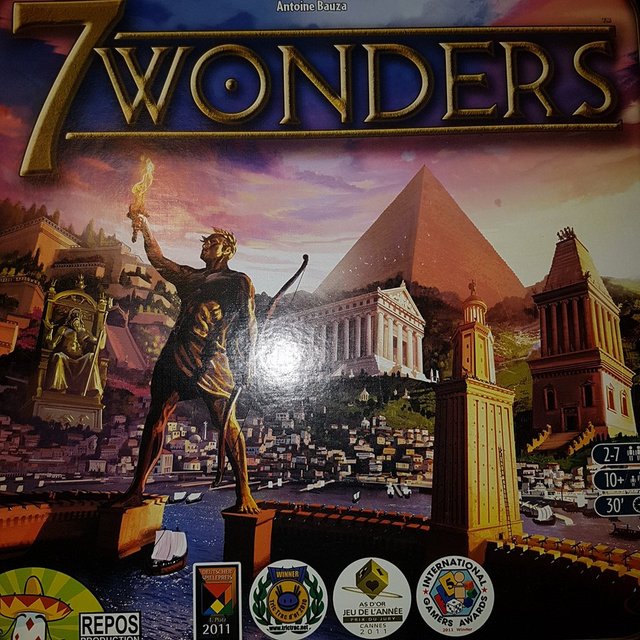
Picture taken by me.
The Basics
7 Wonders has a basic foundation where each player will be assigned one of a group of wonders, each with its own benefits. First there are a bunch of cards broken into 3 ages (such that there will be 7n cards in each age where n is the number of players, i.e. 3 players means 21 cards in each age). In each age there are 6 turns and on each turn each player chooses 1 card from their hand and uses it (either building it, discarding it for 3 coins, or burying it to build a wonder). After choosing their action the player will then pass their hand to next player in rotation based upon age (in age 1 you pass to the left, in age 2 you pass your hand to the right, etc) and each person plays their turn simultaneously meaning hands do not get passed until each player has done their action. To do this each player will put the card face down and then when everyone is ready you flip the card and put it in the place (i.e. build, discard, or bury) required. There are several types of cards to be build so I will go and show examples of those.
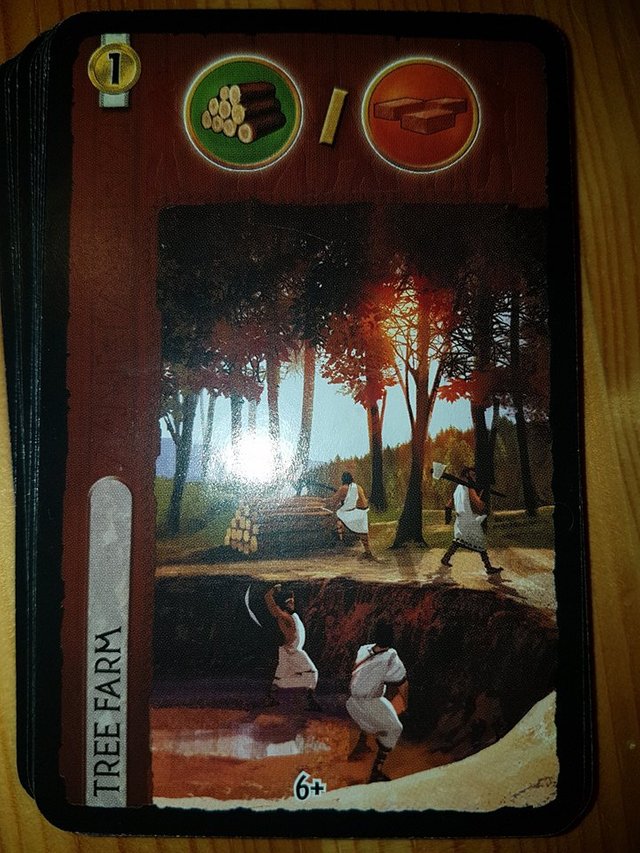
Photo creds: me
Raw Materials/Resources (Brown)
There are 4 types of raw materials: Wood, Stone, Clay, and Ore. You see when/if you decide to build a structure then you will (usually) require some materials to build it. As such you can build structures that will be able to produce certain materials. The one in the picture can make either wood or clay to help you build things. Be careful though because if the structure you want to build costs 2 wood then you will need another source to build the second wood. If you do not have the resource required but one of your neighbours does then you can spend 2 coins to buy that resource from them. Resource cards don't directly give you any victory points but if you have resources it can give you an advantage later on when everyone else needs to buy resources, you will be able to build whatever you want without worry which can help you win. Some wonders build resources already.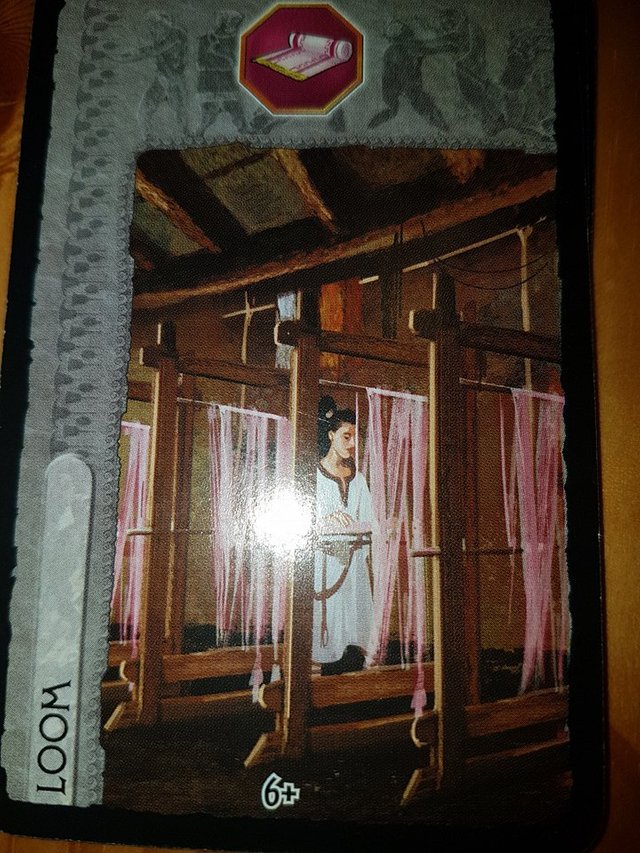
Photo creds: me
Manufactured Goods (Grey)
Similar to resources, manufactured goods are required by some structures and wonders to be built. There are 3 types of manufactured goods: Loom, Glass, and Paper (they use a different name, its just easier to call it paper). They also cost 2 to buy from neighbors. Some wonders build manufactured goods already.
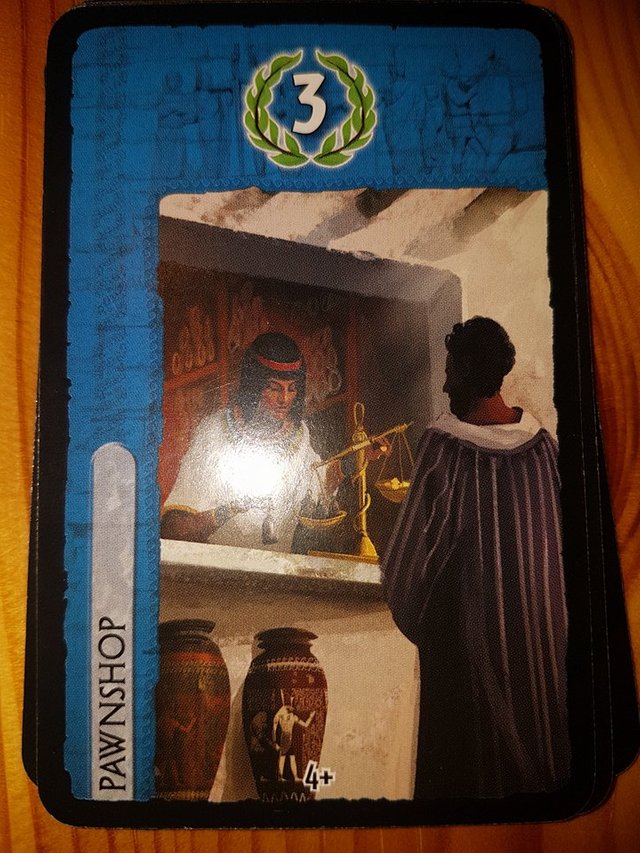
Photo creds: me
Civilian Structures (Blue)
Civilian structures are different, they tend to not do much other than just simply give you victory points. Some civilian structures do allow for the construction of other civilian structures (for free) but it is less common. The structure in question gives 3 points (and cost nothing to build) towards your final score, the largest civilian structures will give you 8 points.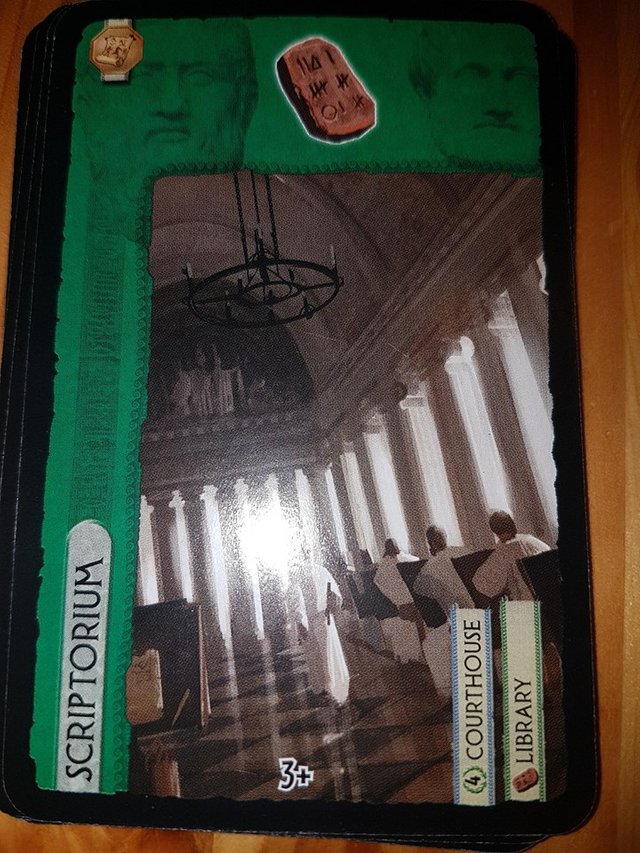
Photo creds: me
Scientific Structures (Green)
Science comes in 3 flavours: Tablet, Compass, and Gears (the science structure in the picture gives you a tablet). Now science structures also allow for an added bonus of free construction, the one in question allows you to build a courthouse and library for free in the second age (if you get the cards). Some of them allow for construction of military buildings and but all of the first and second age science structures allow you to build a science structure in the next age for free. Scoring points with science requires a little bit or arithmetic though and can grow out of control fast. So lets say you have 1 of each symbol (I will have t be a tablet, g be gears, and c be compass) then you take the number of each and square it and add them up like this:N(t)2 + N(c)2 + N(g)2 = total.
since 1 of each:
12 + 12 + 12 = 3
but
for each set of 3 symbols you add an extra 7 points so it becomes 3+7 or 10 points.
If you have 2 of each symbol then you get
4+4+4+14 = 26 points
3 of each
9+9+9+21 = 48 points...
And you don't have to get them in perfect sets, you have have it like
N(t) = 4, N(g) = 2, N(c) = 2
which gives you:
16+4+4+14= 38 points.
The science structure here requires 1 paper to be built.
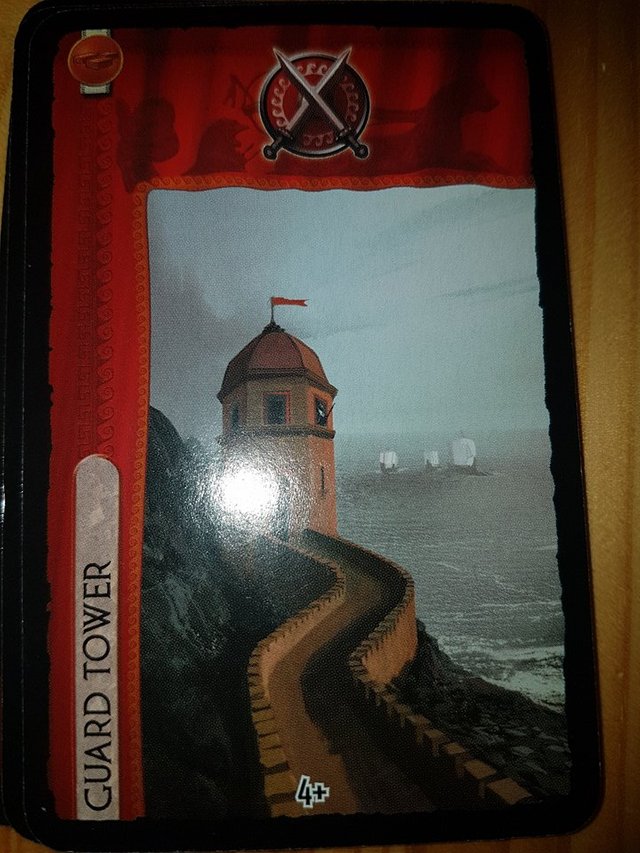
Photo creds: me
Military Structures (Red)
Military is also unique. At the end of each age you count how many military symbols (shields) you have and you compare it to the number your neighbours have. If you have more than you get positive points (age 1 you get +1 point, age 2 is +3 points, and age 3 is +5 points) and they will get a negative 1 point. Now since you always compare only to your neighbor on either side, it means you can gain a maximum of 18 points with military and lose a maximum of 6 points (i.e. -6 points in the military category) so usually its better to not go for this if your neighbors do go for it. If they waste their turns building military when they don't have to then they lose out of other things that will gain them points (like science or civilian) but if your neighbors have no military then building the minimum required structures can give yo a small bonus. It is always better to avoid an arms race as that will give your other opponents a chance to beat you. The card in question here gives 1 shield and requires a single clay to be built.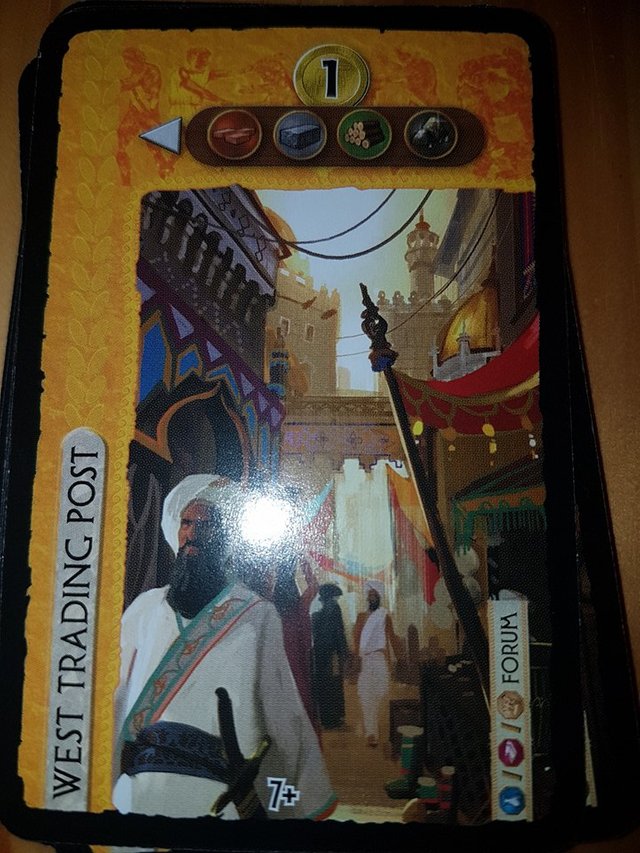
Photo creds: me
Commercial Structures (Yellow)
Commercial structures usually don't directly help you earn points (except in the third age) but they can earn you coins and make it cheaper to buy resources. The resource card shown here allows you to buy resources from the player on your left for 1 coin instead of 2 meaning you can worry a lot less about building resources. Others might produce resources or manufactured goods, some give you coins for each resource card you have, and others give you points for having things like resources, manufactured goods, commercial structures, or even having your wonder built. Some commercial structures also allow for the free construction of buildings in later ages though this is rare. The west trading post allows you to build a forum for free in age 2. Though commercial structures tend not to be a way to directly win by points, it is an easy way to give a small advantage.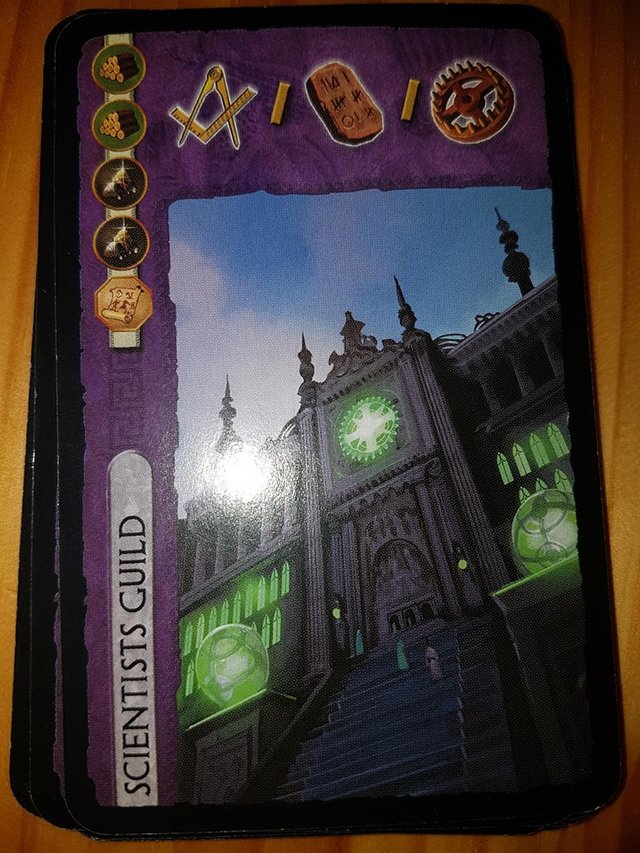
Photo creds: me
Guilds (Purple)
Guilds are cards that purely benefit you and they only occur in age 3. The scientists guild can act in place of any of the scientific symbols (i.e. it acts like a science structure of one of the symbols of your choice) however most of them give you points for cards that your neighbors built. So lets say the person to your left built a bunch of civilian structures (blue) and you have the guild that gives you 1 point per blue structure built by your neighbors. Suddenly you get a bunch of points just by your neighbor having built stuff. Though guilds tend not to be able to single handedly win the game, they can be very very powerful if left unchecked. The guild shown requires 2 wood, 2 ore, and 1 paper to be built.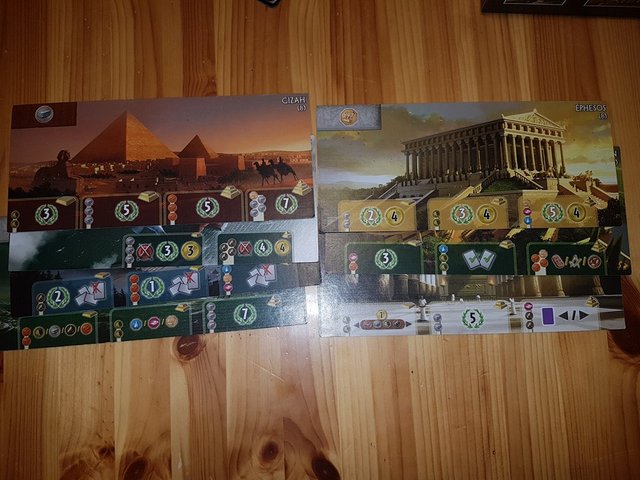
Photo creds: me
Wonders
Wonders, located at the bottom of your wonder board (all 7 wonder boards from the original game are shown). Some of them give you victory points, others give resources, some give coins, and some give military. Olympia allows you to copy a guild from one of your neighbors and babylon gives you science. The point is, each wonder is unique and has benefits.Scoring Coins: so at the end of the game when it comes to scoring, coins have 2 roles. First for every 3 coins you have (at the end of the game) you gain 1 victory point. Second, if there is a tie where 2 players have the same number of points, the player with the most coins wins. So there are benefits to holding coins but it isn't very much. The most points I have held from coins at the end of a game (using the standard rules) was 4 points so they don't give much and I have yet to see a tie.
Custom Rules
My girlfriend and I love this game but we found the 2 person variant rules to be boring as is, so we made our own unique rule set which incorporates almost all of the cards. You see there are enough cards for 7 people to have 6 cards and 1 discarded (last card of each age gets discarded) meaning 49 cards in each age, 3 goes into 48 so by randomly removing 1 card each age you allow for the 2 person variant (which involves a free city) or a 3 person game to use almost all of the cards. This changes the game dramatically. You see in a regular game it is common to see people get between 40-70 points with the winner being around 60-70... In this variant we have seen up to 200 points. Now we also had to add another part to it which is that if you built a structure twice then the second time you need to pay an additional coin on top of its cost... As the original rules state you can't build the same structure twice but we figured why not. So why we play this variant is because we actually find you need to think a lot more. I mean you need to build a little bit of each and if you miss out on any category then that becomes the difference between winning and losing (seriously)
I mean without playing the game it is hard to really convey the strategy required but you always have to look at your neighbors and play based off of them.
So how do I rate 7 Wonders? I think it is fun and amazing and one of the few games that requires in depth strategy. Like a lot of games require thinking but the type of thought in 7 Wonders is something I haven't felt with many other board games.
Entertainment: 9/10 (can get boring waiting for slower players)
Learning Curve: 7/10 (Mechanics are relatively straightforward, after a single game of practice you should be good to go)
Re-playability: 10/10 (Each game is unique due to the randomized hands and the random wonder along with many other items)
Time taken: 9/10 (Usually games last between 20-50 minutes depending on number of players which is good for most board games)
So that is an 87.5% average that I give the game. Do you agree or not?







I really like 7 wonders duel for two players. It has a similar sort of feel, but you draft out of a tableau of cards rather than passing hands. Works very well, and probably one of my favourite middle-weight 2 player games.
I heard about duels but I mean its nice to have games that more people can play for when company comes over.
Yep, there's some games though that just work well with two better, and other you just play with and make work :) And not everyone has space, time or money for a huge collection!
I really like games that feel different between different numbers of players. Isle of Skye and Carcassonne are really different in feel, to me, between 2 and 4 players.
I will go and look into them for a gift then. I mean I have no problems with playing some games